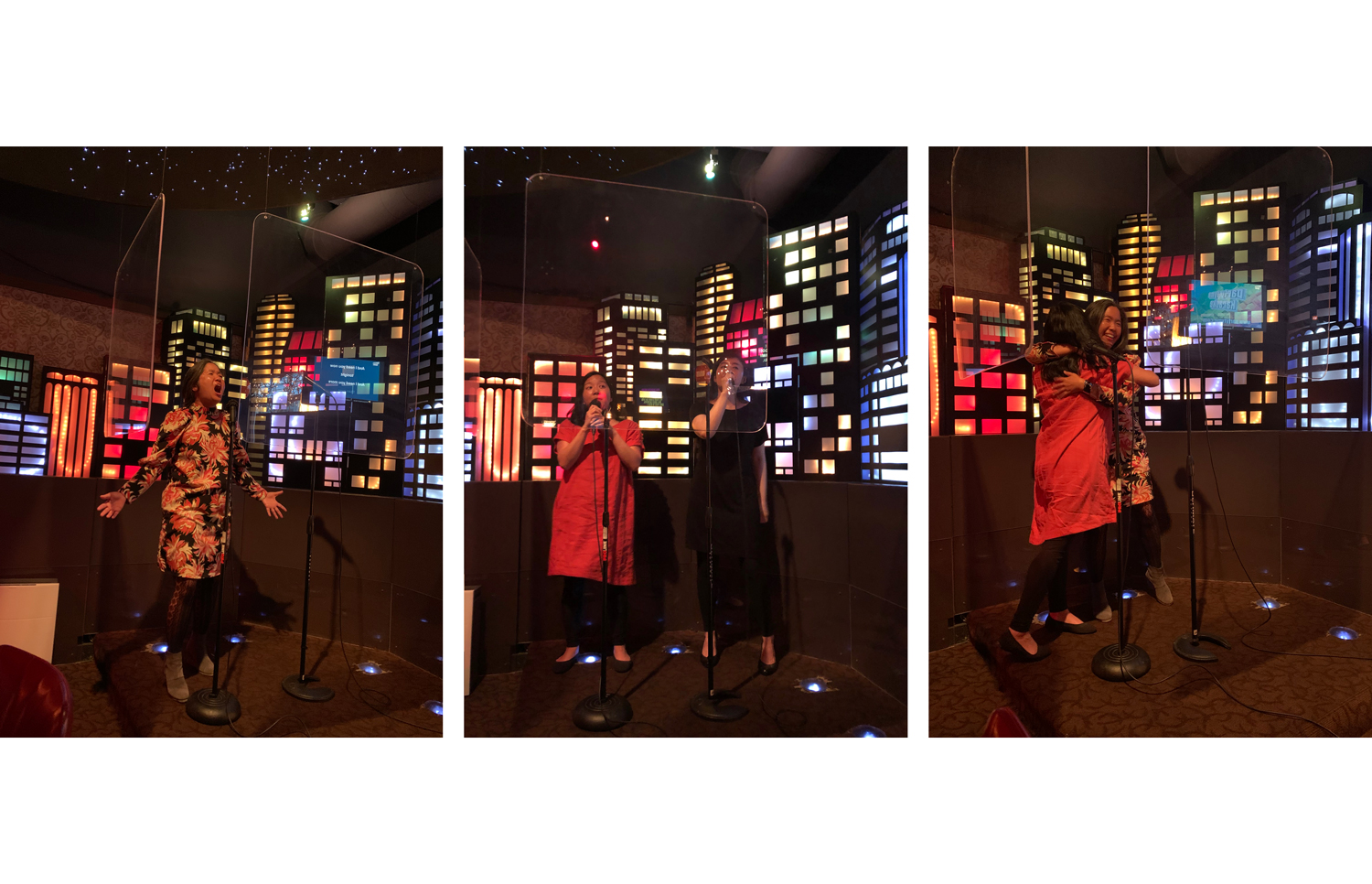
The hostess leaned forward to check my vaccination card, then raised her digital thermometer to my forehead.
“Are you celebrating a special occasion tonight?” she asked, after reading my temperature.
“Just being able to go out,” I said.
She nodded. “We hear that a lot.”
The karaoke bar was dark and cozy, hidden in the middle of the Japan Center mall in San Francisco. In the corner, a dramatically lit cityscape backdrop and a black ceiling of stars illuminated a small stage surrounded by clear Plexiglas screens. The lounge was nearly empty, but within a few minutes, it would fill with other patrons like me, who’d reserved one of 20 spots that evening.
It had felt disorienting walking through the indoor mall and navigating the corridors of masked and unmasked strangers. But as soon as I saw my friend Kirstin at a table by the window, excitement replaced uncertainty. We’d been looking forward to this for weeks, ever since the state relaxed its COVID-19 restrictions, allowing bars and restaurants to reopen at limited capacity.
Read more: I Visited My Grandkids After 16 Months and Realized How Much the Pandemic Had Changed Me
The other members of our party arrived, and we hugged for the first time in months. We marveled at seeing the bottom half of each other’s faces. We ordered cocktails and leafed through the huge binders of songs and artists to write down our requests.
Our group, all Asian American women writers, began doing karaoke together in 2016 when we gathered to discuss the books of Elena Ferrante and celebrated afterward with singing. Karaoke book club, we called it, and after we finished Ferrante’s novels, our nights out endured.
But our meetups, like every other social activity, halted with lockdown. Karaoke was out of the question, especially given concerns over how the respiratory virus spread. We downloaded several apps and tried to recreate the experience online, but we could never find the right software to sync our voices. The best we could do was mute our computers, so we could hear only ourselves, making the reality of our isolation even more apparent. Like so many other joys in our lives, karaoke did not transfer smoothly to Zoom.
When our friend R.O. first suggested the outing over group text in May, I’d happily agreed. But as the date grew closer, doubts crept in. The morning of our get-together, I felt nervous and reluctant. I’d grown used to hermit life, and the prospect of driving across the bridge to sing in a bar with strangers seemed risky, both health-wise, with reports of new variants around the world, and socially. I hadn’t sung, like really sung, in months.
But after a few encouraging texts with another member Vanessa, I put on lipstick and a dress, startling both of my children, who’d grown used to my messy buns and sweatpants.
That night was not a complete return to normal. The servers circled the tables, wiping down surfaces and scooping away empty glasses and plates. We used disposable microphone covers. A maximum of three singers were allowed on the stage at any time. Still, it felt like a milestone in our collective journey out of the nightmare.
The evening’s song choices were eclectic, though all decades-old and nostalgic. Our group requested pop favorites and ballads like New Order’s “Bizarre Love Triangle” and Bonnie Tyler’s “Total Eclipse of the Heart,” while others rocked out to alternative choices like Cake’s “Short Skirt/Long Jacket” and Oasis’ “Wonderwall.” A few suspected karaoke regulars impressed with Frank Sinatra’s “LOVE” and Leonard Cohen’s “Hallelujah.”
But the standout of the night was a stranger’s selection: R.E.M.’s classic “It’s the End of the World,” the lyrics reviving our past year with bittersweet poignance. We sang along and danced off the last 15 months, chasing the unpleasant memories away.
But maybe every song that night was an exorcism. Before the pandemic, karaoke served as a fun, goofy outlet for pent-up frustration and worries over work and family life. Now it felt more urgent and cathartic. It was yet another pleasure we’d taken for granted. That evening, we gave ourselves permission to experience that bliss and freedom again, to be transported by a sentimental melody, with newfound gratitude and relief. To appreciate our love of silly songs, no matter how off-key we are.
May we never leave the stage for so long again
More Must-Reads from TIME
- Why Trump’s Message Worked on Latino Men
- What Trump’s Win Could Mean for Housing
- The 100 Must-Read Books of 2024
- Sleep Doctors Share the 1 Tip That’s Changed Their Lives
- Column: Let’s Bring Back Romance
- What It’s Like to Have Long COVID As a Kid
- FX’s Say Nothing Is the Must-Watch Political Thriller of 2024
- Merle Bombardieri Is Helping People Make the Baby Decision
Contact us at letters@time.com